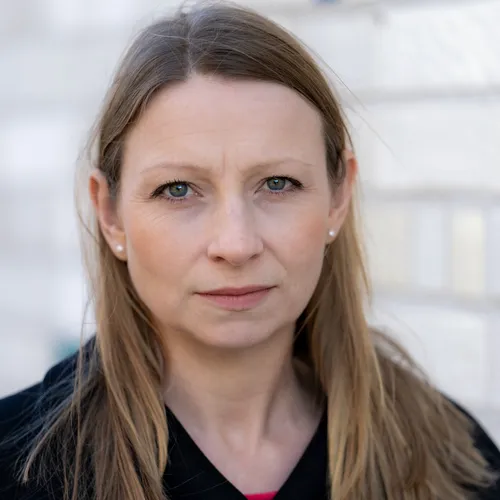
British-German composer Charlotte Bray is an esteemed and in-demand composer, exhibiting uninhibited ambition and desire to communicate. Her music is exhilarating, inherently vivid, and richly expressive with lyrical intensity. An Ivor Novello Award winner (2019), she uses her voice to spotlight global issues, including the refugee crisis, unification, terrorism, and humanity’s impact on nature. She is currently the Composer-in-Residence with L’Orchestre de Chambre de Genève, which is a 3-year position for the 2023/24 – 2025/26 seasons.
Bray’s music has been performed and commissioned by institutions such as BBC Symphony and BBC Scottish Symphony Orchestras, Royal Opera House Covent Garden, Radio-Symphonieorchester Wien, Deutsches Symphonie-Orchester Berlin, WDR Sinfonieorchester, Hong Kong Sinfonietta, Aurora Orchestra, and Birmingham Contemporary Music Group. Her work has featured at festivals in Aldeburgh, Cheltenham, Tanglewood, Aix-en-Provence, Verbier and Kuhmo, as well as with renowned conductors including Marin Alsop, Sir Mark Elder, Sakari Oramo, Oliver Knussen, Jessica Cottis, Daniel Harding, Duncan Ward, and Karina Canellakis.
New commissions during the 2024/25 season include: Mriya for violin and piano, commissioned by Wigmore Hall for Leila Josefowicz ; Bray’s first full-scale opera American Mother, commissioned by Theatre Hagen with libretto by Colum McCann; A Sky Too Small for Orchestre de Paris under Klaus Mäkelä, co-commissioned by Festival d’Aix-en-Provence; and a new work for Ensemble intercontemporain for the inauguration of the Boulez Year celebrations at the Philharmonie de Paris.
Recent solo and chamber works include The Sun and Her Flowers (2023), commissioned by The Queen Elisabeth Violin Competition, and A Lost Place (2023) for string trio, commissioned by Spannungen Festival. The string quartet Ungrievable Lives (2022) - which was written in response to a new installation by artist Caroline Burraway comprising 13 children’s dresses handmade from discarded refugee lifejackets - has been performed alongside the installation by the Castalian Quartet at venues including the Elbphilharmonie Hamburg, Wigmore Hall, Konzerthaus Wien, Kuhmo Chamber Music Festival and Santa Fe Chamber Music Festival. The Earth Cried Out to the Sky (2022) was performed by mezzo-soprano Christina Daletska and pianist Steffen Schleiermacher at Kissinger Sommer Music Festival, while From the Innermost Places (2022), for cellist Anssi Karttunen, featured at Aldeburgh Festival. Crossing Faultlines, a song cycle commissioned by soprano Samantha Crawford and pianist Lana Bode with text by Nicki Jackowska, premiered at Oxford Lieder Festival 2021.
Bray has had a number of orchestral premiere highlights over the recent seasons. A Dark Doorway (2023) was commissioned and performed by Deutsches Symphonie-Orchester Berlin conducted by Robin Ticciati; Forsaken (2022) was premiered by Philharmonisches Orchester Hagen and conducted by Joseph Trafton at Stadthalle Hagen; Landmark (2022), for orchestral winds, percussion and basses, was commissioned and premiered by Dresdner Sinfoniker conducted by Jonathan Stockhammer. Other orchestral highlights include the premiere of The Flight of Bitter Water (2022), performed by Radio-Symphonieorchester Wien under Marin Alsop and broadcast on Ö1. The orchestral miniature Where Icebergs Dance Away (2021) was commissioned and premiered by WDR Sinfonieorchester conducted by Cristian Mӑcelaru, and also received a performance at the BBC Proms by BBC Symphony Orchestra conducted by Sakari Oramo.
Bray has held a number of Composer-in-Residence positions, most recently at Kuhmo International Chamber Music Festival 2023 and Spannungen Festival 2023. Other residencies include Hatfield House Chamber Music Festival (2015), MacDowell (2013, 2015), Aldeburgh Music (2010, 2015), Liguria Study Centre Bogliasco (2013), Oxford Lieder Festival (2011) and Birmingham Contemporary Music Group/Sound and Music (2009-10).
Portrait discs of Bray’s music have been recorded on RTF Classical (2018) and NMC Records (2014). Her work also features on several discs including Tecchler’s Cello by Guy Johnston (King’s College Cambridge, 2017), Oberon Celebrates Shakespeare by the Oberon Trio (CAvi-music and SWR, 2016) and Upheld by Stillness by ORA Singers (Harmonia Mundi, February 2016).
Nos pensées et nos sentiments dépendent du prisme à travers lequel nous choisissons d’observer le conflit concernant l'État islamique en Syrie et en Irak. En Occident, on accorde peu d'attention aux milliers de Yazidis qui, victimes d'un génocide, ont été chassés de leur foyer et réduits en esclavage ou tués.
Le courage et la détermination de Nadia Murad, corécipiendaire du prix Nobel de la paix en 2018 et, au niveau international, voix des Yazidis et de leur lutte continue pour traduire en justice les responsables de la violence et de l'horreur qu'ils ont vécues - sont à la fois frappants et source d'inspiration.
Intitulée A Lost Place, l'œuvre est dédiée aux Yazidis et explore les émotions liées à la persécution et à la terreur qu'ils ont subies. Dans le premier mouvement, les mélodies sont supprimées et exprimées avec nervosité ; des cris retentissent, des glissandi descendants sanglotent et des techniques telles que le sul ponticello, qui produisent un son sinistrement obsédant, sont employées.
Le deuxième mouvement répond à une citation de Murad : « C'est un sentiment étrange et creux. La nostalgie d'un lieu perdu vous donne l'impression d'avoir disparu à votre tour ». Avec l'alto et le violoncelle dans des rôles d'accompagnement, le violon mène mélodiquement, chantant et créant des moments délicats inattendus. La partie centrale est encore plus évocatrice, nostalgique, comme si elle rappelait la maison. Mais, brusquement et de plus en plus, des sons stridents traversent l’œuvre. Sombrement, une section sèche de pizzicato nous ramène à une prise de conscience de tout ce qui a été perdu, de tout ce qui était familier, de tout ce qui constituait le foyer.
Lourd et inquiétant, le troisième mouvement commence à l'unisson. Un matériau mélodique passionné fait son apparition, encore une fois principalement au violon, ponctué de coups et de motifs déchiquetés. En progressant, l'élan prend de l'ampleur et culmine dans des coups de poing concertés.
Un quatrième mouvement délicat flotte lentement dans le spectre, transmettant l'impression d'être « hors du corps », comme si l'on se regardait d'en haut. Les cris de glissandi du premier mouvement reviennent. Le pulse est suspendu, comme si la musique - qui représente le corps - pouvait s'envoler à tout moment.
© Charlotte Bray